Book II, Chapter 6: The Coach Inn
List of Chapters | Previous Chapter
Hermann woke to the sound of whinnying horses and baying hounds. It was well after midnight. He sat up in the upper bunk of the room located over the carriage house where the employees of the Eltzbacher Coach Inn were quartered.
Benedikt the ostler was calling out from the stables. “Moritz! Help!”
Clad only in a nightshirt, Hermann ran from the doorless bunk-room and found Monika in the corridor. She was lighting the lamp on the hook near the steps.
“What’s going on?!” he asked.
“I don’t know. There are dogs in the stables. Benedikt has gone to investigate. I’m worried. Please hurry.”
“Where’s Walter?”
“Who?”
“I mean, Florian.”
“Asleep in his room, I imagine.”
Barefoot, Hermann padded down the steps as quickly as he could. He grabbed a horse whip lying on a carriage seat and stepped outside into the December night. Benedikt left the stables open, because the temperature was mild and he thought it would do the horses good.
He crossed the yard and heard the two stallions kicking against the planks of their pens. Inside, the whites of the horses’ eyes flashed in the moon’s bright glare. Three mastiffs staggered about the dirt floor, their mouths foaming. Since they could not reach the horses, they had turned their attention to Benedikt who stood wielding a pitchfork, back to the wall. The flanks of the rabid dogs were bloody. The ostler had wounded them all.
When Hermann cracked the whip, the mastiffs bent their necks in his direction. Suddenly, they stopped growling. They began to whimper. Their joints shivered as they collapsed where they stood, teeth chattering, legs extended. Their bodies convulsed violently for several minutes. And then they were dead.
Walter entered holding the lantern Monika had kindled.
“Keep away from the dogs’ blood,” Hermann told him. “You don’t have shoes on. You might catch their disease.” The orphan saw that Hermann stood in a puddle of black gore.
“Hydrophobia is not communicated that way,” Benedikt replied, lowering his pitchfork. He stared at Hermann in horror.
Hermann recalled that Monday morning when he and Walter arrived at the inn . . .
Slung over his shoulder had been the canvas bag containing his father’s belongings. Knocking on the front door, he stepped back next to Walter who held the sealed letter of introduction. The sound of children playing could be heard within.
Hermann removed his hat, and looked up at the hinge-shaped wooden fragment nailed to the doorpost. He was trying to figure out what it was. There was a three-pronged symbol etched into the top of it, which was angled toward the interior of the building.
The door swung open and an attractive woman in her mid-thirties greeted them with a smile. “Looking for a place to stay?”
“No,” Hermann said. “We’re here to see a woman named Elischewa. I have a letter for her.”
The woman emitted a laugh and lowered her voice conspiratorially. “I think it would be more appropriate for you to address her as Frau Eltzbacher. She’s the proprietress of this establishment. My name is Monika. I’m her assistant. Please, come in.”
They stepped inside. Three boys chased one another around a large table dominating the center of a lofty common room. At the head of the table sat an old woman sat eating a small lunch of bread and soup. Her iron-gray hair was bound up in a black snood. Monika went to her, leaned over and whispered into her ear. She nodded, wiped her hands with a napkin and beckoned Hermann and Walter to approach.
“Goodness!” exclaimed a woman by the hearth whose husband sat across from her. They were obviously the children’s parents. The woman waved her hand in front of her face to clear the air.
Hermann snatched the letter from Walter and placed it on the table. “We’ll be outside,” he mumbled to Monika.
“What did he say?” Elischewa asked.
“He says the two of them will wait outside. . . They stink.”
“Nonsense,” Elischewa said. “I was fortunate enough to be born without a sense of smell.”
“I’m afraid we were not so fortunate,” the woman by the hearth commented archly. There was an aristocratic lilt to her voice. She covered her nose with both hands.
“I set the rules in this house.” Elischewa replied. She gestured to the husband and wife. “Today’s coach to Bremen did not have enough room for all of them. I said they could stay here gratis until Wednesday’s coach, with the understanding that their board will not be included.”
She spoke as if the family was not present. The children stopped playing and went to their parents. Monika bit her lower lip, obviously uncomfortable by the turn of events.
“Come along,” the husband said in a soothing voice, rising from his chair and heading to the door. “Am I correct in assuming the village is located at the end of the lane that runs behind your stables?”
“That is correct,” Elischewa replied, breaking the seal of the letter. “Herr Mattner runs a public house near the bridge. Tell him you are staying here and explain your predicament. I am sure he will provide you with a hearty board at a reasonable rate.”
The family left.
When Elischewa had read the letter through twice, she seized Monika’s forearm. “They’re here to work!” She pushed her chair back and stood up. “Welcome, both of you. . . ” She glanced at the letter again. “Welcome, Moritz and his son Florian. My brothers in Kohlendorf vouch for you. I need no further references. You will be provided with lodging and food; and I pay a respectable salary.”
Hermann looked incredulously at Monika.
“Frau Eltzbacher is a fair mistress,” she affirmed.
Elischewa spread her arms at the newcomers’ appearance. “But you both look like convicts who’ve crawled out of a moat. That won’t do.”
“We have money to buy clothes,” Hermann suggested. “I understand there are clothiers and tailors in the village.”
It was only now that Frau Eltzbacher seemed to have noticed Walter. For a moment she didn’t speak. “I had a son,” she said. “He’s deceased.”
“Your brothers told me of your loss. I’m very sorry.”
Elischewa nodded. “I have kept his childhood clothes and I’m certain they will fit young Florian.” She looked away from Walter and examined Hermann with a smirk. “You share my husband’s build as it was a few years ago. A bit taller, though. I can find something for you to wear until you’re able procure fitted garments on your own. Monika?”
“Jawohl, Frau Eltzbacher.”
“Take the boy out back and introduce him to Benedikt. Have your husband fill the galvanized tub in the carriage house with warm water so the two of them can bathe.”
Walter follow Monika through the kitchen to the back door. When they were gone Elischewa touched her chin.
“Do you have a surname?”
“I’m afraid I do not.”
“No matter. Come with me, Herr . . . Moritz. I’d like you to meet my husband.”
They exited the front door. Elischewa conducted him down a brick path that wound around the side of the building and into a copse of trees where a small cottage with an herb garden stood. Although it was November, the sage and thyme flourished in their beds.
Hermann noticed that the cottage had an identical hinge-shaped piece of wood nailed to the doorpost. Elischewa kissed her fingertips and touched them to the fragment before crossing the threshold. The Austrian Catholic—ever superstitious—frowned but stepped inside behind her.
A balding man sat in a rocking chair reading a book. He closed it and covered his nose when Hermann entered. He smiled in an effort not to be rude. “Rather ripe guest, my dear,” he commented.
“Abner, this is Herr Moritz. He and his son Florian will be working here. He has no surname. I told him you might have some clothes he could wear until he can procure something tailormade from the village.”
“Of course,” Abner replied, rising from the chair. He smiled at Hermann. “Long ago I was a hale and barrel-chested as you. But now I’m running to fat.”
“If I may say so,” Hermann commented. “You do not look fat.”
“He hides it well,” Elischewa quipped.
She motioned for Hermann to follow her down a hallway to a dressing room. The old man, delighted by the unexpected company, joined them. Hermann noticed that, even inside the house, the hinge-like fragments of wood were mounted to each doorpost. He wanted to ask what they were for and why the old woman had kissed her fingers and touched the one outside, but had not done so for the ones inside. But he dared not risk insulting her out of ignorance.
He remained in the hall since he hadn’t been invited to cross into the dressing room. The old woman opened a large wardrobe. She swept wooden hangers from one side to the other. Hermann looked at the old man, who had stopped at the end of the hall and was regarding him sadly.
“Did you serve in the military with my son?” he asked.
Elischewa walked from the wardrobe to the door in five steps. She poked her head out of the room. “Abner, he never knew Joseph.” She handed Hermann a heavy coat. “Try this on.”
“The material is quite dear,” Hermann remarked.
“The winter will be fast upon us. You need a heavy coat.”
He slipped it on. It was insulated and comfortable. He had not worn anything as nice as this since his days at the Landecker estate.
“It looks excellent on you,” Abner remarked.
Elischewa nodded. “It does favor you.”
“I’ll make sure it doesn’t get damaged before I return it.”
“It’s yours now,” Abner said. “I’ll never wear it again.”
“Yes. You heard my husband. It’s yours.” Elischewa began to talk so rapidly that Hermann had difficulty keeping up with her. “Abner has shirts and work trousers as well. The trousers are hemmed, so I can let them out to accommodate your height. It will take a few days. You’ll need to wear the pair you have on until I can make the adjustments.
“In the meantime, I shall gather up a few articles of clothing from Joseph’s old room for Florian. I want you out of these rags before incoming guests see you. I run a respectable establishment. Good first impressions make for a good reputations. That’s my motto. Once I’ve bundled these clothes up, Monika will bring them over to the carriage house.”
Hermann nodded like a fool, not knowing what to say. It was obvious to him that her generosity was only superficially tied to the business. There was something in her manner that hinted at a nostalgia for the days when her children were still under her roof. I almost think her brothers knew our arrival would have this effect on her.
“Thank you, Frau Eltzbacher. I promise you that my son and I will eneavor to live up to your expectations.”
The old woman smiled broadly. “Turn left outside the cottage,” she said, “and you’ll see the carriage house and stables. Benedikt will prepare a bath for you. And Monika will show you to your living quarters.”
As Hermann turned to leave, she tapped his shoulder. “Wait, take this robe for the bath; and this shirt as well, since the one you have on is torn.”
“That’s one of my favorite shirts!” the old man exclaimed.
“Abner, you can’t fit in it anymore!”
The old man’s brows shot up. “I suppose you’re right.” He looked sheepishly at Hermann. “The buttons are made of cherry wood.”
“I’ll take care they’re not damaged.”
“Do with it as you wish,” Abner replied. “It’s yours now.”
Monika saw Hermann approaching and went to him so that she could speak to him in confidence. “My husband can be a bit of a churl. But he’s got a heart of gold. Please don’t be offended by what he says.”
Hermann assured her that he was not easily offended.
The ostler stepped out of the carriage house with a smile on his face. He had filled the tub with hot water and provided Walter with a bar soap and brush to scrub with. As the boy set about disrobing, Benedikt drew the curtain across the wire so the boy could enjoy his bath in private. The tub was shared by all the residents of the carriage house, including Monika.
But when the ostler saw the boy’s father darken the doorway his smile vanished and he looked away.
That’s odd, Hermann thought. He was smiling just now as he was preparing Walter’s bath. Either the man recognizes me from somewhere, or he’s plotting mischief against the boy. Maybe the suspicious look in my eyes rattled his nerves.
“Benedikt,” Monika said. “This is Moritz, Florian’s father. When the boy is done, can you refill the tub so that he too can bathe?”
Benedikt responded with a curt nod.
Later that afternoon, having bathed and wrapped himself in the robe Elischewa had given him, Hermann stood in the ample living room over the carriage house. There was a half-kitchen built into this area with a small table. A door near the cutting board led into a private bedroom with a wide bed where Monika and Benedikt slept.
Monika washed the trousers that Hermann had been wearing, along with his socks. The articles were drying on the potbelly stove.
“I noticed that one of your socks has a hole in it,” she said. “I can darn it for you.”
“Please don’t,” he replied. “I’m not planning to keep these clothes much longer.” How do I tell her that I’ve been wearing the clothes of a hanged man.
Hermann stood because he was naked under the robe and was afraid of inadvertently exposing himself to the ostler’s wife.
Within minutes he heard Benedikt and Walter ascending the steps.
Walter was decked out in the fresh clothes that Elischewa had found for him. They fitted him to a T.
“You look smart, boy,” Hermann commented.
“Thank you, Papa.”
“It’s getting dark,” Benedikt remarked, grabbing a matchbox and going to the small table on which stood a shaded lamp. Hermann’s shoulder satchel lay on the table as well. “What’s this?” the ostler asked, setting the matchbox down and opened the bag.
“Sorry,” Hermann replied. “That’s mine. Just . . . things I’ve kept.”
“It’s stuffed with eiderdown feathers.”
“Yes, we thought we might be able to sell these.”
“Eiderdown is water resistant, you know?”
“Yes.”
Hermann and Monika looked at each other.
“I’m sure you’ll get a few groschen for them.” He went silent as he lifted the wooden figurine from the bag. It depicted a withered old man holding a lantern in one hand and peeling away the flesh covering his abdomen with the other. The figurine’s entrails were filled with carrion worms.
Walter had never seen the statue up close. His lips curled down in revulsion.
Benedikt placed the figurine next to the unlit lamp. “Excellent craftsmanship,” he commented.
“Thank you. My father made it.”
“It’s called a memento mori. . .”
“I know.”
“Of course, you know. You’re a Tyrolean Catholic.”
Monika went to the oven to check whether Hermann’s clothes were dry.
“It’s true, I’m Austrian. But I’m from Linz.”
“No, I’m not mistaken. You’re Tyrolean.”
Monika lifted one of the stove’s plates and the iron clanged. She raised her voice and spoke animatedly. “Benedikt is quite brilliant. He used to be a schoolmaster. He knows Latin. Do you see that book on the shelf over the sofa? It’s a Latin primer. He taught me to construe from that book when I was a girl. That’s how we met. He was my tutor.”
“Like Abelard and Eloise,” Benedikt smiled wistfully.
Hermann didn’t know what he was talking about so he decided to change the topic. “What are those pieces of wood on the doorposts? They’re even in here on the doorposts of the bunk rooms. But the bunk rooms have no doors.”
“They’re called mezuzahs. The bunk rooms don’t have doors, but they have lintels. That’s why they’re mounted to the doorposts here as well.”
“What’s that symbol written on them? Is it a magic seal?”
“No. It’s Hebrew. It’s the letter shin, the first letter of Shaddai (Almighty), one of the names of God.”
“Are you Jewish?”
“No.”
Hermann squinted at the man. “Why are these mezuzahs hanging on the doors?”
“They have scrolls in them.”
“Scrolls? Like a spell?”
“My God, you’re so stupid. It’s out of the Bible. Surely you as a fanatical Catholic know the passage from Deuteronomy: These words which I command thee, shall be upon thy heart. Thou shalt teach them diligently unto thy children. Thou shalt talk of them when thou sittest in thy house. And thou shalt write them upon the doorposts of thy house.”
“I don’t know Latin. No one has ever instructed me on that passage.”
“There are plenty of German translations of the Bible.”
“They’re inaccurate!” Hermann snapped.
Monika jumped.
There was a long silence during which no one spoke.
Walter could tell Hermann was exhausted. He was feeling cornered. The boy went to him and put his arm around his waist. “We’ve been up since before dawn,” he explained to Benedikt and Monika. “Would it be possible for us to turn in early so that we can get some sleep?”
“Of course,” Monika said. “You can sleep in any of the bunk rooms. There’s a toilet at the end of the hall so that you don’t have to go outside during the night. But be mindful, because it doesn’t have a lock and all of us have to share it.”
Hermann went to the stove to fetch his clothes. They were warm but not entirely dry. “Thank you both for your help today. Florian and I will sleep in the bunk room closest to the steps.”
“Papa. . . ”
“What?”
“I want to sleep alone tonight.”
“Why?”
“Because I’ve never had a room to myself. I want to see what it’s like.”
Hermann’s grip on the clothes tightened. The scars in the crook of his arm began to itch. “If that’s what you want. . .”
“It is,” the orphan repeated. He went to Hermann and made a gesture for him to lean down so he could whisper into his ear.
Monika and Benedikt began discussing the schedules for the coaches for the rest of the week.
“Papa, I know that you think I have some power to keep your bad dreams at bay. But that’s all in your head. Please, I want to be by myself tonight. We’ve been together constantly since our flight from the workhouse. And having you always nearby is starting to irritate me. I’ll sleep in the bunk room next to yours. If you have a nightmare, rap on the wall and I’ll come and abide with you till dawn.”
“Alright.” Despite the boy’s tender years his reservoirs of understanding ran deep. The candor by which he had been able to communicated his emotional strain had shed light on an aspect of Hermann’s own character that he had been too blind and self-absorbed to recognize. He’s fed up with all of my moping. I can’t blame him.
Monika and Benedikt bade the two of them good night and descended the steps to complete their late-afternoon and evening chores.
Hermann entered the bunk room and heard Walter next door climbing the ladder to the top bunk. In his own room, Hermann noticed that it was only the top bunk that had been provided with bedcovers and a pillow. He didn’t want to sleep so high, because he feared that if he had a nightmare, he might fall out of bed and snap his neck on the floorboards. So he removed the sheets from the upper bunk and made up the lower one, moving the pillow to the opposite end so that as he lay in the bed he would be facing the entrance.
He didn’t have a nightshirt and was naked under the robe, so he decided to sleep in the buff. Once he had climbed into the bed and drawn the sheet and blanket up to his neck, he kept his eyes fixed on the door. As the sun set, a gray shaft of light struck the mezuzah. He wondered if the scroll in its case would protect an accursed soul such as his own. He began to mumble a prayer, but fell asleep before he said, “Amen.”
The next thing he knew Walter was tapping on the wall. The boy wasn’t knocking from the upper bunk but from the lower one. Then came a scrabble of claws. A voice said, “Moritz!”
Hermann gasped and sat up. The ostler stood at the threshold of the bunk room, lantern in hand. “You had a long sleep. It’s not yet dawn. Florian is at the coach inn helping Monika prepare breakfast. I want you to come with me to the stables. I’m going to teach you how to curry the coats of the horses and clean their hooves.”
“I’ll need time to dress.”
“Yes, you will.” Benedikt replied. He turned his back on Hermann but remained at the door. “I know you still don’t have a full set of clothes, and that you will have to rely on the rags you brought with you for the next few days, but I want to remind you that my wife passes down this corridor to use the toilet. I’d prefer if you slept on the upper bunk. It’s harder for her to see at that elevation. Also, sleep with your pillow toward the door, because with your head pointing the other way around, there is a risk of you exposing your private parts—even if you are wearing a nightshirt.”
“I understand. I’m sorry.”
Benedikt returned to the living room. When Hermann had dressed and stepped out into the corridor, he saw the ostler in the lantern’s dim light pondering the memento mori. “Are you ready?” he asked wearily.
“Yes,” Hermann replied, pointing to the mezuzah. “It worked.”
“What worked?” Benedikt stood up and stretched.
Hermann realized he sounded ridiculous. “I slept very well last night. Peacefully.”
“Bring the lantern when you come.” The ostler descended the steps.
Hermann grabbed the lantern and went to the top of the landing. He turned and contemplated the mezuzah. He kissed his fingertips and was about to touch it as he had seen Frau Eltzbacher do. But hesitated. If I do this, I could be committing a profanation. He went to cross himself. But he didn’t have the spirit to do that either. What’s happening to me. I don’t know what to believe anymore. My faith did not save my family.
He raised the lantern and walked down the steps.
Two items had been left inside the canvas bag lying on the table: Moritz’s straight-razor and shaving mirror. Now that Hermann was gone, a mighty gust of wind blew down the corridor, disturbing the sheets in the bunk rooms and casting the stray eiderdown into the air. The feathers drifted through the room, landing on the stove and the ratty sofa shoved against the wall. They collected around the base of the memento mori. And as the pale light of dawn filtered through the windows’ burlap curtains, the shaving mirror in the bag cracked.
I wanted to thank
for helping me out with some questions I had concerning the care of horses. Her expertise in this field is on display in her novel Of Winds and Wolves, a breathtaking Iron Age epic that takes place on the Central Eurasian steppes.

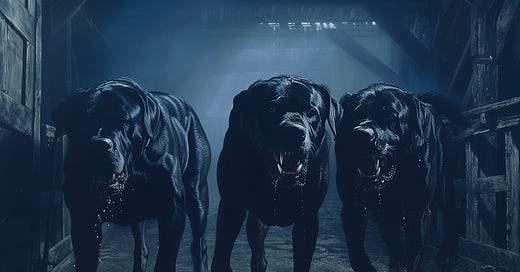





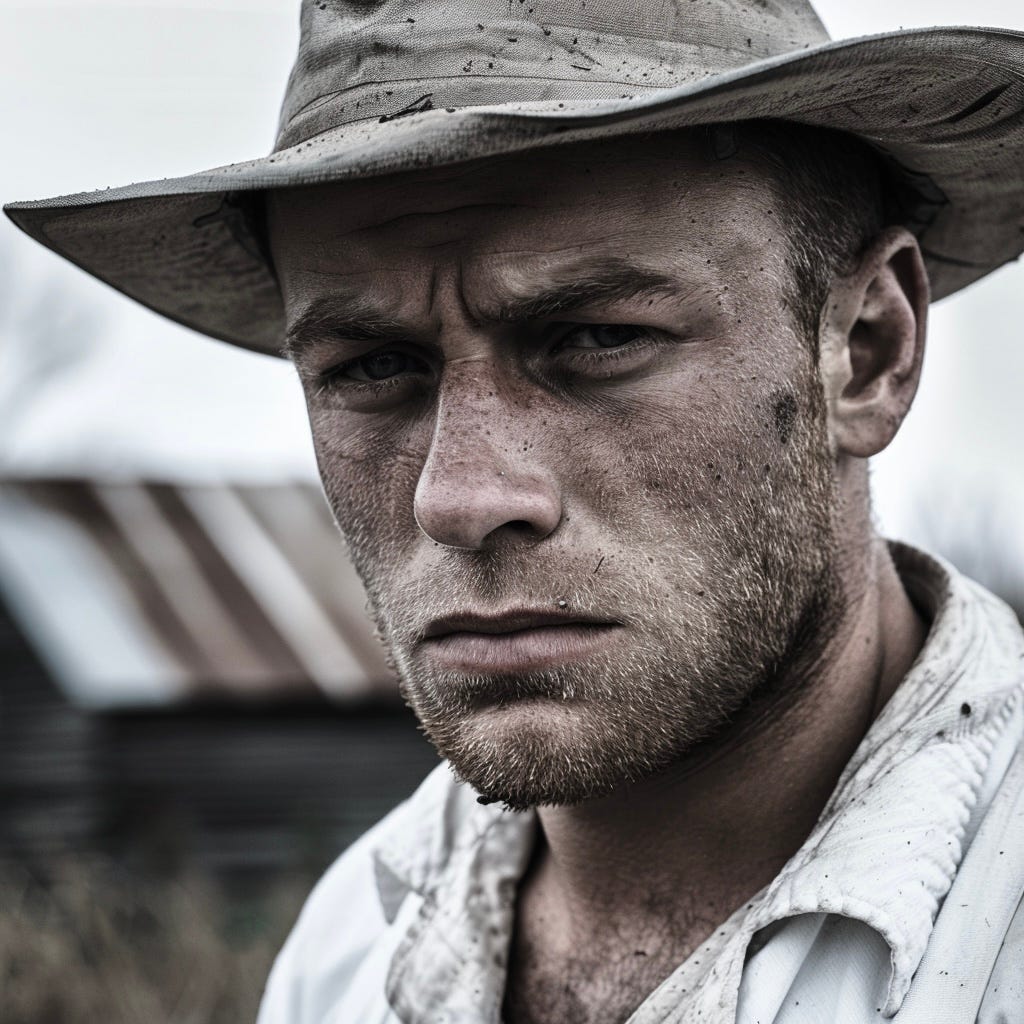
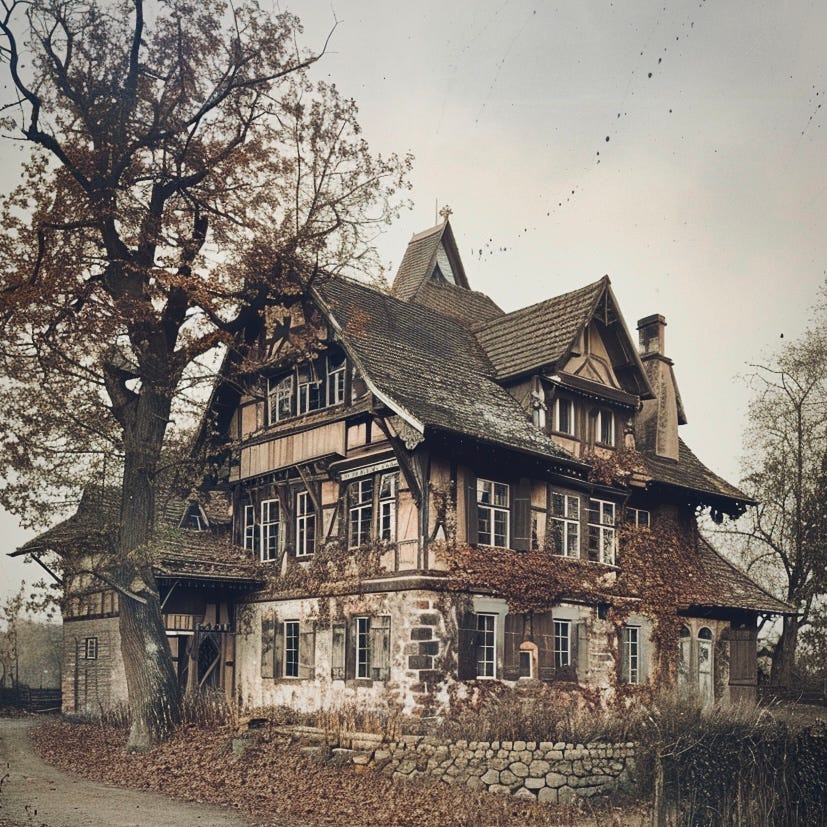

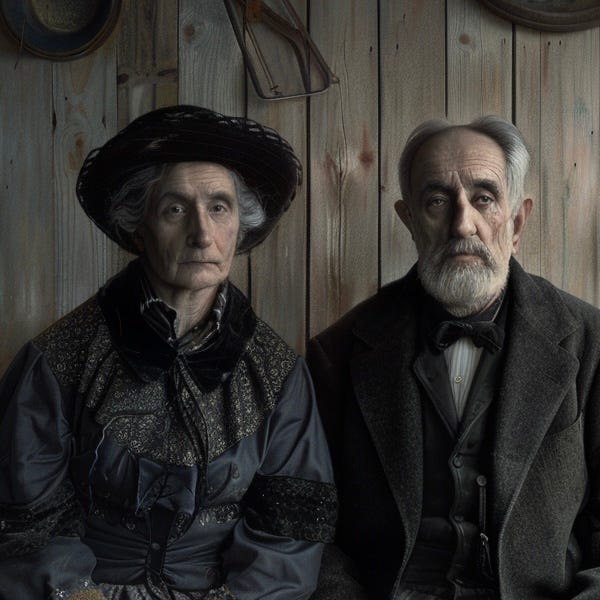
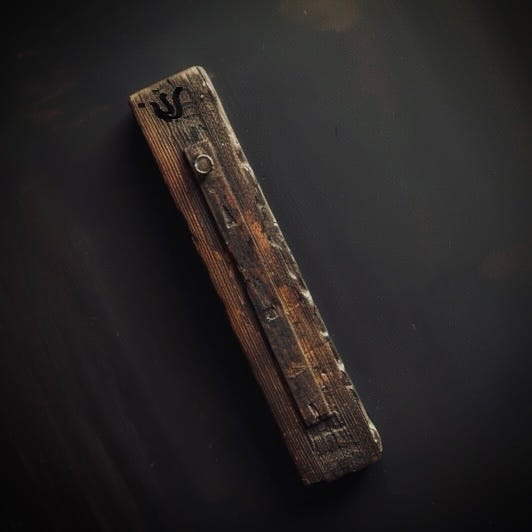
Another great chapter, Daniel 👍🏼
It’s a privilege to read such great storytelling but what I continue to find so impressive is the continual underlying current of dread that runs through Hermann’s tragic tale. Each step of his adventure has its own challenges and complications, but, because of the strength of your writing, you can almost see, in your minds eye, the shadow of the werewolf haunting his every step. And he probably knows he can never outrun it but he still goes on.
Brilliantly done 👍🏼
Their travels continue to take them to intriguing places! The first sepia image of the stables looks almost exactly like an old photo from my great-grandparents. I'm not sure where it was taken, but there was a family farm somewhere with a barn just like that!
Also, thanks for the kind mention! I'm always happy to share horse knowledge!